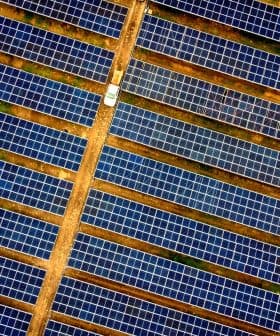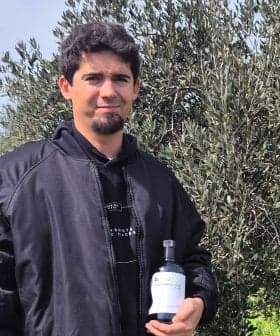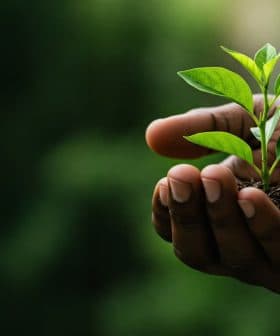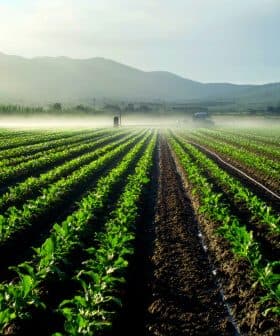New Project Could Turn Olive Oil Byproducts Into Revenue Stream
Olive oil pomace and wastewater are broken down into protein and phenolic isolates, both of which can be used in various industrial applications from pet foods to cosmetics.
 Photo courtesy of Matthew Schwarzkopf
Photo courtesy of Matthew SchwarzkopfThe Pro-Enrich project in the European Union aims to use agricultural residues from rapeseed meal, olives, tomatoes, and citrus fruit to create protein and phenolic isolates, which can replace petroleum-based products in various goods. By breaking down olive pomace and wastewater using enzymatic degradation, the project seeks to create a value chain that benefits both the environment and olive farmers financially.
A new research project in the European Union is investigating ways in which to use agricultural residues as an alternative source of protein and phenolic isolates.
The Pro-Enrich project is seeking to turn byproducts created by the production of rapeseed meal, olives, tomatoes and citrus fruit into these two isolates, which can be used instead of petroleum-based products in a range of everyday goods.
The whole idea of the project is to create a value chain.
“The whole idea is to replace fossil-based sources of phenolics and also create proteins that are coming from Europe rather than being imported from somewhere else,” Matthew Schwarzkopf, a professor at the University of Primorska in Slovenia who is working on the project, told Olive Oil Times.
The protein and phenolic isolates can be used in a range of products from pet food and industrial resins to pharmaceuticals and cosmetics.
See Also:Olive Oil ResearchSo far, Pro-Enrich, which is part of the European Union’s Horizon 2020 research and innovation program and has received funding from the Bio Based Industries Joint Undertaking, has managed to create protein replacements from the production of rapeseed meal. These protein replacements already have been used to make pet food and adhesives for a wood panel production company.
The group will not begin using byproducts from the production of olive oil in these types of processes until the 2019 harvest season begins in Slovenia. However, Schwarzkopf has already been to a local mill in Slovene Istria and gathered 200 liters of olive pomace and wastewater to be frozen and processed later in Denmark.
“I went to some olive mills and all of this waste material is really nasty, polluted and toxic,” he said. “But the stuff that makes it toxic is good for other things.”
These two byproducts will be broken down using enzymatic degradation, which is done with microorganisms, before being separated and then filtered.
“They [the research team in Denmark] use an enzymatic degradation of the waste material and this breaks down the cell walls of the olives and the pits,” Schwarzkopf said. “This helps when they do the wet extraction.”
“Then they centrifuge everything to separate the components and do an ultra-filtration,” he added. “This gives you exactly the molecular weights you are looking for, which helps you to isolate the phenols and proteins.”
On top of the various environmental benefits that the project is seeking to have, Schwarzkopf also said that olive farmers and oil producers may stand to benefit financially too.
“The whole idea of the project is to create a value chain,” Schwarzkopf said.
In the future, olive farmers may be able to sell their wastewater and olive pomace directly to companies that will then bio-refine them into any one of the aforementioned products.
Currently, olive oil producers dump their wastewater, which is not toxic, into the sewer and either pay someone to remove the olive pomace or compost it to be used as fertilizer later on. Pomace cannot be used as a fertilizer right away due to its high levels of acidity, which require time and effort to oxidize in a compost pile.
“If they get any money from this material, it is a benefit for them,” Schwarzkopf said. “At the very least, we come and take it and they don’t have to pay to get rid of it because it is considered a waste material.”
At the moment, the project has only worked on processing 500 liters of agricultural residues at a time and once the initial experimentation phase is over, they plan to scale up. If all goes according to plan, Pro-Enrich hopes to expand this project outside of Slovenia to larger olive oil producing countries.
The team is already working with a large mill in Spain, which Schwarzkopf said is ideal because larger amounts of olive pomace and wastewater are concentrated in one place. This would help to make the logistics of gathering and transporting these byproducts easier for actual companies, which will eventually replace Pro-Enrich as the ones refining the pomace and wastewater.
“I like this kind of project because it has so many industrial partners who are leading the direction of the research, which helps focus the project,” Schwarzkopf said.
In other words, working with the industries which will eventually purchase and refine these byproducts increases the likelihood that olive farmers and oil producers will benefit financially.









